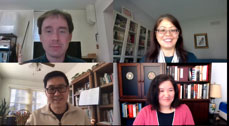Webster Film Series, Confucius Institute Co-Host 'Not One Less' Post-Film Discussion
December 16, 2020
 On Friday, Dec. 4, the Webster University Film Series and the Confucius Institute
at Webster University jointly hosted the event “Not One Less” Post Film Discussion.
Participants gathered to hear the perspectives of speakers Tianlong Yu, professor
of Education at Southern Illinois University Edwardsville, and Yongzhen (Joy) Shu
Curtin, adjunct professor of Chinese Cinema and Popular Culture at Webster University.
On Friday, Dec. 4, the Webster University Film Series and the Confucius Institute
at Webster University jointly hosted the event “Not One Less” Post Film Discussion.
Participants gathered to hear the perspectives of speakers Tianlong Yu, professor
of Education at Southern Illinois University Edwardsville, and Yongzhen (Joy) Shu
Curtin, adjunct professor of Chinese Cinema and Popular Culture at Webster University.
“Not One Less” is the documentary-style feature film about 13-year-old Minzhi Wei, who is brought in to substitute teach a class in rural China for a month, and ends up tracking down a student who has deserted her class to find a job in the city. According to Yu, this film, though not truly a documentary, provides a realistic portrayal of rural poverty in China, a country with high inequality that is reflected in the rural-urban divide. At the same time, Yu was struck by some positive aspects of the film. An expert in education, he noted that the film features some inspiring pedagogical innovations, no small feat in an under resourced school with large class sizes. He also noted that, in spite of the prevalence of bureaucracy, power, and money that are the dominant forces driving everyday interactions, human relationships are dynamic, characterized by human kindness, determination, resilience, and hope.
After Yu’s observations, Shu Curtin provided the cinematic context for this film. In giving an overview of earlier genres such as Rural Socialist-style films, which portrayed somewhat idealized versions of rural life, and the New Documentary Movement of the 1990s, which showed a grittier version of life and provided indirect commentary on Chinese society, she showed how “Not One Less” drew upon these traditions. She and the event host, Webster Film Series Director Pete Timmermann, also talked specifically about the director, the celebrated Zhang Yimou, and the evolution of his filmmaking in terms of genre and sources of funding, and how this history plays into understanding the film.
Following these talks, a question and answer session featured an active and inquisitive audience. They were keen to learn more about the current state of rural education in China, including how this intersected with government policies and rural-to-urban migration. The audience also wondered at the local impact of the film, which did in fact attract significant donations.
This event went over the allotted time and seemed to leave many wanting to continue the discussion.
